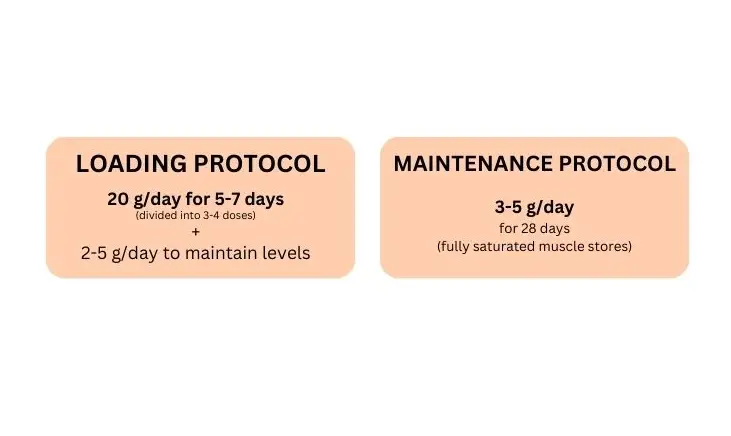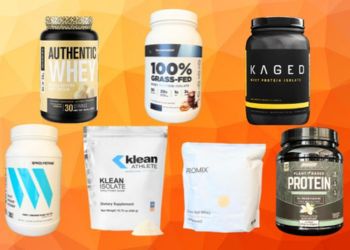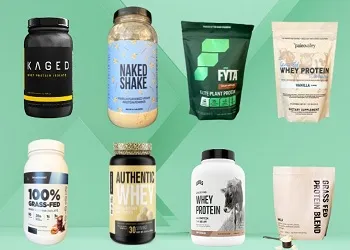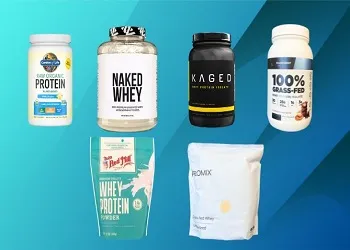Creatine and caffeine are two of the most popular fitness aids on the market that serve up several ergogenic benefits. Taking creatine and caffeine together doesn’t appear to elicit adverse reactions but can enhance exercise performance, strength, and energy. Aim for 3-5 g/day of creatine to maintain muscle stores and no more than 400 mg of caffeine per day to optimize results.
Quick Look
- Creatine is an amino acid derivative with ergogenic benefits for exercise performance.
- Caffeine is a nervous system stimulant that functions as an adenosine antagonist to reduce fatigue.
- Mixing creatine in coffee doesn’t have adverse effects and can optimize energy, exercise performance, and muscle strength.
- The recommended creatine intake is 20 g/day if loading or 3-5 g/day for maintenance, while caffeine intake should be capped at 400 mg/day to avoid side effects.
- Unlike caffeine, the timing of creatine intake isn’t as important as being consistent with daily supplementation.
Table of Contents
Creatine and Caffeine
Caffeine and creatine monohydrate are perhaps two of the most popular ergogenic aids and widely used dietary supplements in the fitness world. Creatine has been extensively studied for its benefits for exercise performance, muscle growth, and, more recently, cognition and memory. At the same time, caffeine offers numerous benefits for focus and attention, energy, and disease prevention.
But when it comes to mixing creatine and caffeine, its efficacy comes with increasing energy levels and power output during a workout.
These two substances hit the nail on the head for athletes looking to optimize their workout and achieve their health and fitness goals.
How Does Creatine Work?
Before diving into the details of creatine, let’s ensure we understand how creatine works.
Despite popular belief, creatine is an amino acid derivative (not an amino acid) that’s naturally present in the human body and is widely available in many animal-based food sources and, of course, through supplementation.
Creatine is naturally synthesized from three amino acids:
The primary function of creatine is to supply energy to high-energy tissues, such as the brain and muscles. This is accomplished thanks to phosphocreatine’s high-energy phosphate bonds that can immediately replenish adenosine triphosphate (ATP) stores during energy-demanding circumstances, such as heavy lifting.

Research suggests that creatine monohydrate has several ergogenic benefits. These include improving:
- Force and power output
- Strength
- Anaerobic threshold
- Work capacity
- Recovery
- Training adaptations
Some research also suggests that creatine may improve anaerobic exercise performance by extending time to exhaustion and enhancing glycogen storage.
Put simply, creatine is vital in increasing ATP production, which serves as energy for nearly every cell in the body. By increasing creatine stores, the body can replenish ATP stores faster and maintain short-duration exercise performance at a higher level.
Health Benefits of Creatine Supplementation
We’re not going to cover the health benefits of creatine in great detail, but here’s a brief overview of what creatine has to offer:

- Improve exercise performance: Creatine’s ability to rapidly replenish ATP stores makes it one of the best supplements for improving exercise performance, especially during high-intensity activity or heavy lifting; research shows that creatine could enhance high-intensity exercise performance by 10-20%. Other research shows creatine can also enhance post-exercise recovery and injury prevention.
- Increase muscle muscle mass and strength: Creatine is most well-known for helping athletes pack on muscle. Not only does creatine enhance energy availability during heavy lifts, but it also helps to mitigate muscle protein breakdown, leading to increased muscle mass. It does this by increasing the phosphocreatine/creatine ratio in skeletal muscle tissue, which increases the capacity for rapid ATP resynthesis during repetitive high-intensity exercises. Some research suggests greater muscle mass results from water retention in muscle tissue, but others speculate it could be due to greater osmotic pressure from higher creatine levels, resulting in muscle cell swelling, which is thought to be a key stimulus for cell growth.
- May improve cognitive performance: Newer research shows that high-dose creatine supplementation may help boost brain creatine stores, offering a positive effect on cognition and memory, especially in older adults or during times of metabolic stress—for example, sleep deprivation. The role of creatine in cognition is supported by research from Cerebral Creatine Deficiency Syndromes, showing that brain creatine deficiency results in profound intellectual disability, which is reversed by taking creatine supplements.
The Basics of Caffeine
Caffeine is another ergogenic aid with powerful benefits for performance. Caffeine is a natural stimulant that works through several proposed mechanisms:
- Antagonism of adenosine receptors
- Inhibition of phosphodiesterase
- Release of calcium from intracellular stores
- Antagonism of benzodiazepine receptors
The most well-known of these mechanisms is acting as an adenosine receptor. Because caffeine and adenosine are structurally similar, caffeine binds to adenosine receptors in the brain to block the action of the neurotransmitter, thereby inducing stimulatory effects. By blocking adenosine’s inhibitory effects, caffeine has indirect effects on the release of various hormones and neurotransmitters, including:
- Norepinephrine
- Dopamine
- Acetylcholine
- Serotonin
- Glutamate
- Gamma-aminobutyric acid (GABA)
As a result, caffeine affects the function of various systems in the body—cardiovascular, respiratory, renal, and nervous systems. In the central nervous system (CNS), caffeine increases the release of stimulatory hormones, including cortisol and adrenaline, which increase focus, alertness, and overall energy. This is the primary reason why athletes consume caffeine pre-workout—it reduces fatigue and improves mental and physical performance.
However, excessive caffeine intake can have the opposite effect—it can lead to a slew of issues, such as sleep issues, anxiety, high blood pressure, and even gastrointestinal issues in some people.
Caffeine Health Benefits
Many athletes depend on a cup of coffee for pre-workout, but the benefits extend beyond just energy. Here’s an overview of the health benefits associated with moderate caffeine intake:
- Increase energy levels
- Reduce fatigue
- Reduce type 2 diabetes risk
- May slow neurodegenerative disease progression
- May reduce the risk of cognitive decline and dementia
- Lowers risk of depression
- Reduces risk of heart disease and stroke
The Downside of Caffeine
While a moderate intake of caffeine has been linked to several beneficial outcomes, excessive amounts might result in some adverse effects, especially for the cental nervous system.
As a CNS stimulant, caffeine sensitivity is a big deal—people who are more sensitive to caffeine are more likely to experience negative effects following consumption. This includes:
- Jitters
- Anxiety
- Restlessness
- Difficulty sleeping
- High blood pressure
- Digestive issues
- Increased heart rate
- Headache
Individual responses to caffeine vary based on how your body metabolizes caffeine, which means some people may experience unwanted side effects even at low doses.
Can I Mix Creatine and Coffee?
Mixing caffeine and creatine is something many athletes do to optimize energy, exercise performance, and muscle strength—but should you do it?
Putting creatine in caffeine shouldn’t have any adverse effects, as caffeine is a stimulant and creatine is not. More often than not, creatine and caffeine can complement each other well, and research supports this.
Let’s take a look at some research.
Study #1
A 2011 study published in the European Journal of Applied Physiology looked at the effects of acute caffeine intake on intermittent high-intensity sprint performance after five days of creatine loading. Twelve physically active men followed a protocol of either creatine + placebo (0.3 g/kg of creatine for 5 days followed by 6 mg/kg of placebo) or creatine + caffeine (0.3 g/kg of creatine for 5 days followed by 6 mg/kg of caffeine). They were to perform six 10-second intermittent high-intensity sprints on a cycling ergometer, with 60-second rest intervals between sprints.
The following metrics were measured:
- Mean power
- Peak power
- Rating of perceived exertion (RPE)
- Heart rate
Blood samples tested included: lactate, glucose, and catecholamine concentrations.
Results showed that mean and peak power were significantly higher during most sprint tests in the group consuming creatine + caffeine; heart rates, plasma lactate, and glucose were also higher in the creatine + caffeine group.

Conclusion: Caffeine consumption following a creatine load augmented intermittent high-intensity sprint performance.
Study #2
Similarly, a 2010 study published in the Journal of the International Society of Sports Nutrition looked at the effect of a pre-workout supplement containing caffeine, creatine, and amino acids combined with three weeks of high-intensity interval training (HIIT) on aerobic and anaerobic running performance, training volume, and body composition.
Twenty-four moderately-trained athletes were given either a pre-workout blend or placebo; the active supplement (Game Time®) is a proprietary blend containing whey protein, cordyceps sinensis, creatine, citrulline, ginseng, and caffeine. Subjects consumed their supplements 30 minutes before all testing and training sessions.
Measured metrics included:
- Cardiovascular fitness (VO2max)
- Training volume
- Percent body fat (%BF)
- Lean body mass (LBM)
Results showed that both the control and test groups showed a significant increase in VO2max from pre- to post-training, but the group taking the pre-workout supplement saw a greater increase of 10.3% compared to a 2.9% improvement in the placebo group. Training volume increased 11.6% for the supplement group, while BF% decreased from 19.3% to 16.1% (compared to 18% to 16.8% in the placebo group). LBM also increased from 54.2 kg to 55.4 kg in the supplement group while decreasing slightly in the placebo group. Interestingly, anaerobic running capacity increased 22.9% in the placebo group but only 10.6% in the supplement group.
Conclusion: Researchers concluded that a supplement containing caffeine and creatine improved VO2 max, critical velocity, and LBM when combined with HIIT, but the HIIT protocol alone led to increases in anaerobic running performance, VO2 max, and body composition.
Is It Safe to Mix Creatine and Coffee?
When it comes to safety, there’s research to back that up. One study showed that a pre-workout supplement containing both creatine and caffeine was safe and effective for increasing aerobic capacity and muscular strength in healthy, recreationally active men.
That said, some research suggests that caffeine ingestion may actually blunt the ergogenic effect of creatine. Although it’s unlikely that there is a pharmacokinetic interaction, some researchers suggest that the culprit behind caffeine’s purported effect on creatine may be explained by their opposing effects on muscle relaxation time or gastrointestinal side effects from consuming them simultaneously.
It’s also important to consider other effects of simultaneous ingestion.
Caffeine may act as a diuretic in people who don’t consume it frequently; people who regularly consume caffeine are less susceptible to its diuretic effects. Creatine, however, has the opposite effect—it can cause the body to retain water acutely. These opposing effects could negatively affect exercise performance in some people.
Long story short, research doesn’t allude to any dangers of consuming creatine and caffeine together, but side effects may vary between individuals.
Benefits of Creatine and Coffee for Athletic Performance
Caffeine and creatine are both shown to be safe and effective performance enhancers, but what can they do together? Here’s an overview of their benefits:
- Improve power and strength: Creatine maintains energy stores during intense exercise by increasing phosphocreatine (PCr) levels in your muscles. The high-energy phosphate bonds in PCr immediately replenish ATP, allowing for more explosive strength and power. Research shows that caffeine ingestion can also improve strength and power.
- Increase lean muscle mass: Studies show that caffeine and creatine can increase strength gains and muscle mass. Specifically, they may help you lift more or increase reps performed, encouraging greater muscle hypertrophy.
- Boost alertness and energy: Caffeine is one of the most popular stimulants that revs up the CNS by blocking the action of adenosine. While caffeine metabolism varies based on the individual and the dose, caffeine consumption pre-workout can enhance energy and improve focus and alertness.
However, while there are many benefits to consuming coffee and creatine together, there are also downsides:
- Digestive discomfort: Caffeine sensitivity varies based on the individual, but it’s known that caffeine stimulates colonic motor activity, which moves food through the digestive tract faster, which can lead to mild gastrointestinal discomfort and more frequent bowel movements.
- Sleep disruptions: Due to its stimulating effects on the nervous system, consuming coffee (and caffeine in general) too close to bedtime could disrupt sleep; the half-life of coffee ranges from 1.5 to 9.5 hours but averages about 5 hours. Since sleep deprivation can hinder athletic performance, it’s recommended to stop caffeine consumption at least six hours before bed (more if you’re highly sensitive to caffeine).
Tips to Maximize Benefits of Creatine and Coffee
Mixing creatine with coffee is a practice many athletes use. If you’re considering it, here’s how to maximize the benefits (and minimize any side effects):
- Hydrate properly: Caffee is a natural diuretic, so it’s important to be hydrated throughout the day, especially if you’re engaging in vigorous exercise. As a general rule of thumb, your urine should be the color of lemonade.
- Set your upper caffeine limit: Caffeine sensitivity varies based on the person, with some tolerating significantly higher doses than others. Limit your daily consumption to 400 mg of caffeine per day to avoid adverse effects.
- Be consistent with your creatine dose: Studies have shown that consistent creatine intake is often more important than the dose. For maximum benefits, stick to a dose of around 5 g/day if you’re not doing a creatine loading phase.
- Avoid caffeine at night: If you train in the evening, consider dropping caffeine from your pre-workout stack. Creatine will still offer many of the same benefits on its own, but curbing the caffeine can reduce the negative effects on sleep.
- If you’re sensitive, switch to decaf: While decaf doesn’t offer the same stimulatory effects as caffeinated coffee, it still offers many of the same health benefits as regular coffee and is a good alternative for people with caffeine sensitivity.
Dosing and Timing Recommendations
If you choose to take caffeine and creatine together, there are a few best practices you’ll want to note for optimal sports and athletic performance.
Caffeine
Based on the International Society of Sports Nutrition’s stand on caffeine and exercise performance, the recommended dose of caffeine is 0.9–2.7 mg per pound of body weight (2–6 mg/kg) for optimal ergogenic benefits. For most people, that’s around 3 to 4 cups of coffee daily. After ingestion, 99% of caffeine is absorbed within 45 minutes, reaching peak plasma concentrations anywhere between 15 and 120 minutes; the variation in time is due to differences in the rate of gastric emptying and the presence of other dietary constituents.
Based on this, consuming caffeine about 60 minutes before exercise is recommended.
Creatine
How much creatine you need depends on whether you’re following a loading or maintenance protocol:
- Loading strategy: 20 g/day for 5-7 days to maximize muscle saturation, followed by 2-5 g/day to maintain muscle levels
- Non-loading strategy: 3-5 g/day daily (it can take up to 28 days to maximize muscle creatine saturation)

Based on this, a 200-pound person should be consuming around 27 g/day for the first week, followed by 3-5 g/day to maintain creatine muscle stores.
As for timing with creatine, there’s no real consensus on when the best time to take creatine is. In most cases, being consistent with your intake offers better results than specific timing.
Frequently Asked Questions
Does creatine have caffeine?
Creatine is an amino-acid derivative that does not contain any caffeine. While creatine doesn’t offer stimulatory properties as caffeine does, it’s been shown to have several ergogenic effects that help improve athletic performance. It is, however, safe to mix with caffeine.
Can you put creatine in coffee?
Yes—creatine can safely be mixed with coffee to optimize energy levels, exercise performance, and muscle strength. Adding creatine to caffeine hasn’t been shown to have adverse interactions, but the two substances can complement each other well.
Does caffeine cancel out creatine?
In most cases, no. Although research is scarce, some have suggested that caffeine counteracts the ergogenic effects of creatine. That said, there’s not enough conclusive evidence to suggest combining creatine and caffeine can reduce the ergogenic effects of creatine.














